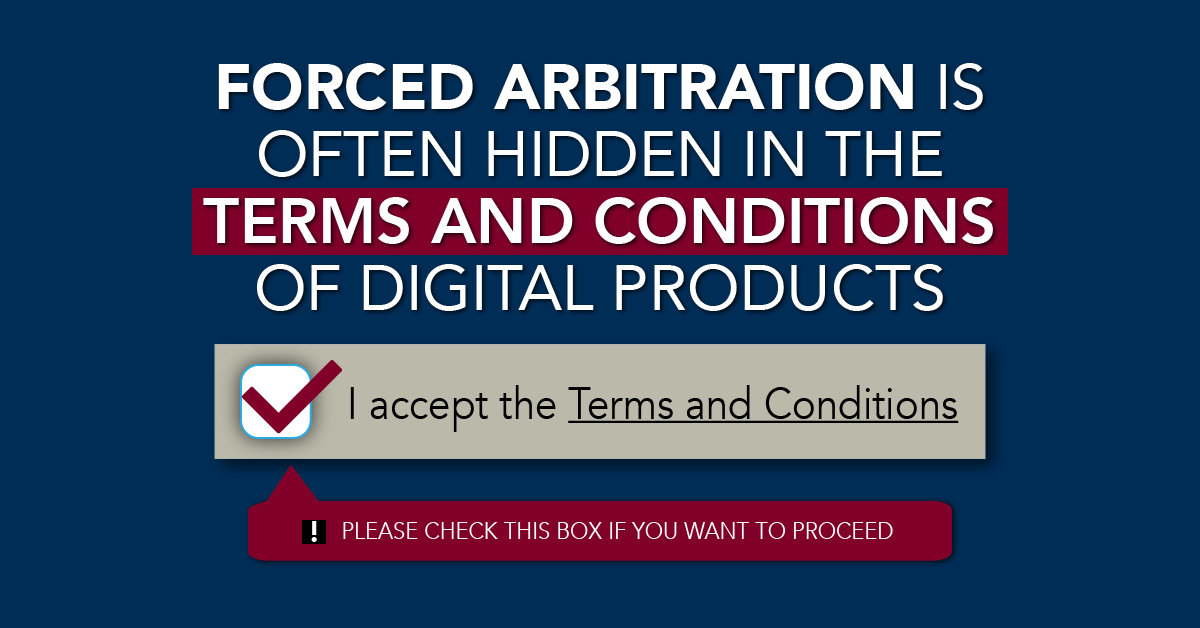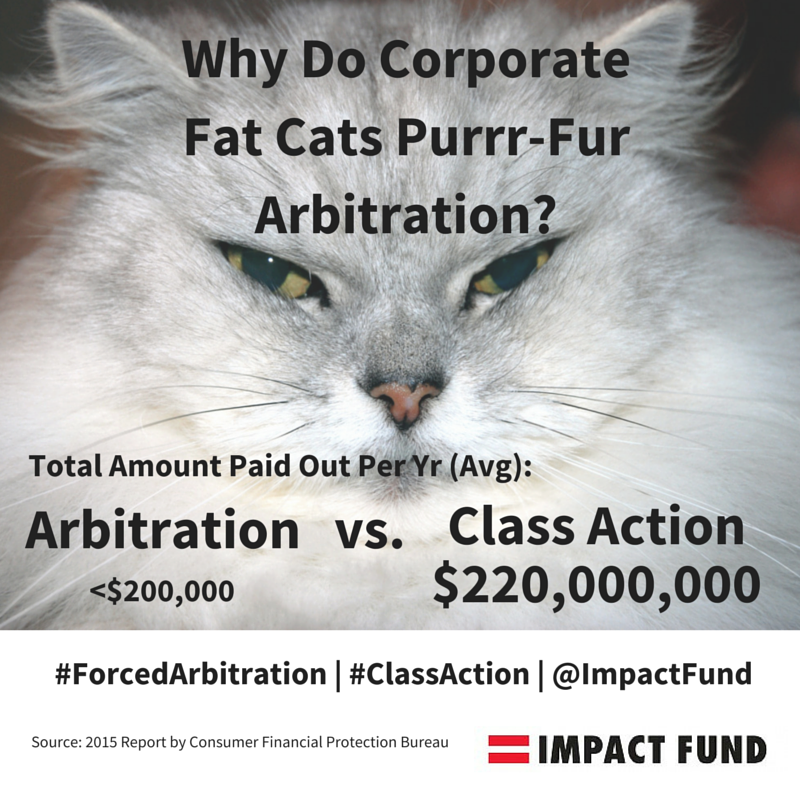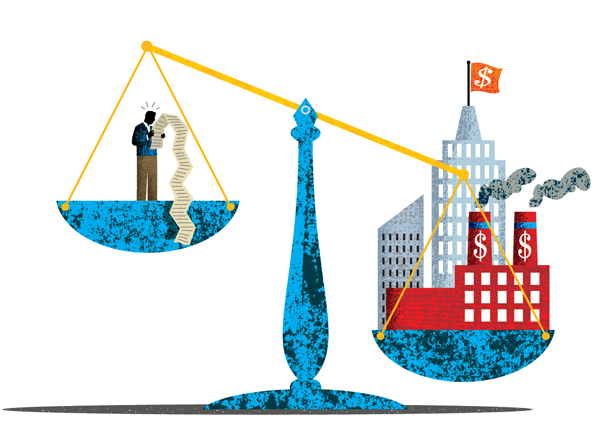A Beginner’s Guide to Forced Arbitration: A Barrier to Social and Economic Justice
Sanjana Manjeshwar, Grants Data Intern
Have you ever bought a cell phone, opened a bank account, or signed employment paperwork for a new job? If so, chances are, you’ve probably agreed to a forced arbitration clause.
Concealed in the fine print of many standard-form contracts, arbitration clauses force workers and consumers to give up their right to sue a company in court. Most forced arbitration agreements also contain class action waivers, which ban people from bringing and joining class action lawsuits against companies. People who are subject to forced arbitration agreements are instead required to resolve disputes with companies through private, individual arbitration.
Forced arbitration agreements are extremely common. Over the past few decades, a series of pro-corporate Supreme Court decisions have expansively interpreted the Federal Arbitration Act to permit most arbitration agreements and class action waivers in consumer and employment contracts.
Many of America’s leading businesses, such as banks, airlines, tech companies, private student loan providers, and insurance companies, require customers to sign pre-dispute arbitration agreements. Out of the 100 largest companies in the United States, 81 have arbitration agreements and 78 have class action waivers in consumer contracts. Similarly, more than half of non-union private sector employers—which collectively employ over 60 million workers—compel employees to sign arbitration agreements. The use of forced arbitration also significantly increased during the COVID-19 pandemic.
How does forced arbitration prevent access to justice?
Lawsuits, and especially class action lawsuits, have historically helped ensure that corporations observe laws that protect workers’ and consumers’ rights. When people can’t join class actions, it becomes very difficult for them to hold corporations accountable. Bringing individual claims through arbitration is usually expensive and time-consuming for the average person. Most people who are subject to forced arbitration agreements do not actually resort to arbitration. Instead, they fail to pursue their claims, and the injustices they’ve suffered go unaddressed. As a result, forced arbitration allows corporations to avoid consequences for violating the rights of workers and consumers.
Even when people do use arbitration proceedings, the outcomes are usually not in their favor. Victims are less likely to prevail in arbitration, compared to in litigation, and, if they do win, they tend to receive lower damages. Corporations often insert specific terms into forced arbitration agreements that disadvantage workers and consumers who choose to bring claims through arbitration. According to a report from the Economic Policy Institute, “The average consumer ends up paying financial institutions in arbitration.”
And despite the term “arbitration agreement,” workers and consumers rarely knowingly “agree” to forced arbitration clauses when they accept a new job or purchase a product. These clauses often consist of complex legal jargon buried in the terms and conditions of contracts. Research reveals that most people do not understand that they’re giving up their right to sue when they sign a forced arbitration agreement. This data demonstrates how forced arbitration reflects the extreme power imbalances between everyday people and corporations.
Forced arbitration replicates existing inequalities
Some people are more at risk of being exploited by corporations than others. As a result, forced arbitration agreements and class action waivers contribute to social and economic injustice. For example, low-income people of color are disproportionately affected by predatory lending and consumer fraud. Likewise, low-income workers, workers of color, and immigrant workers are more likely to suffer rights violations, such as wage theft and unsafe working conditions. Such employees might also experience identity-based workplace discrimination. These statistics are particularly concerning because forced arbitration agreements are especially common in industries with large numbers of low-income workers, Black workers, and female workers. Because vulnerable communities are more likely to experience harm at the hands of corporations, forced arbitration agreements can exacerbate existing inequalities when they prevent victims of illegal conduct from seeking justice in court.
Moreover, when forced arbitration agreements ban class actions, workers and consumers are unable to address systemic issues and achieve broad social change. Class actions can draw public attention to corporate misconduct and force companies to change their practices. In contrast, arbitration is a confidential process. When claims are individually forced into arbitration, the public does not learn why these claims have been brought. This secrecy, in turn, enables future violations of workers’ and consumers’ rights because corporations are not deterred by the threat of public accountability.
The ongoing fight to end forced arbitration
There have been some promising recent developments in the fight to end forced arbitration. With the rise of the #MeToo movement, advocates highlighted how forced arbitration agreements have been used to silence survivors of sexual violence in the workplace. In March 2022, Congress passed the Ending Forced Arbitration of Sexual Assault and Sexual Harassment Act, which prohibits the use of forced arbitration agreements and class action waivers in cases involving claims of sexual assault and harassment. The legislation is a major achievement that will allow survivors to have their day in court. Also, in the summer of 2022, the Supreme Court limited the enforceability of some forced arbitration agreements in two unanimous pro-worker decisions (Morgan v. Sundance and Southwest v. Saxon).
Grassroots activism and organizing against forced arbitration have been on the rise. For example, in 2019, Google employees around the world participated in mass walkouts to protest the company’s use of forced arbitration agreements in its employment contracts. In response to public pressure, Google ended the use of forced arbitration agreements for employees. Similarly, after protests from law students, many large law firms stopped requiring some employees to sign forced arbitration agreements.
However, as evidenced by the continued prevalence of forced arbitration, much work remains to be done.
The Impact Fund applauds the leaders in our community such as Public Justice, Gupta Wessler, and Altshuler Berzon, who are active at the Supreme Court, in other appellate courts, and in Congress fighting to end forced arbitration. This advocacy is also supported by the work of scholars like Professor Myriam Gilles of Cardozo Law and Professor Alexander Colvin of Cornell University, who shed light on the negative impacts of forced arbitration.
Our previous blog posts highlight how forced arbitration undermines civil rights in the workplace and prevents corporate accountability. We are grateful to be part of the coalition of civil rights organizations supporting the passage of the Forced Arbitration Injustice Repeal (FAIR) Act. The FAIR Act would ban the use of all pre-dispute forced arbitration agreements and class action waivers in employment, consumer, civil rights, and antitrust disputes. The FAIR Act passed in the House of Representatives in early 2022 and is now in committee in the Senate.
The passage of the FAIR Act is critical for ensuring equal access to justice for workers and consumers. By eliminating people’s legal rights, forced arbitration agreements enable corporate wrongdoing and prevent systemic change. Meaningfully addressing and remedying social and economic injustice requires an end to forced arbitration.
Learn more:
“Forced Arbitration,” Public Justice, https://www.publicjustice.net/what-we-do/access-to-justice/forced-arbitration/.
“Myriam Gilles of Cardozo Law Testifies on Behalf of Ending Forced Arbitration,” https://www.youtube.com/watch?v=xRF-j5xSSi4&t=24s.
“Mandatory Arbitration Clauses are Discriminatory and Unfair,” Public Citizen, https://www.citizen.org/article/mandatory-arbitration-clauses-are-discriminatory-and-unfair/.
Faces of Forced Arbitration, https://facesofforcedarbitration.com/real-stories/.




